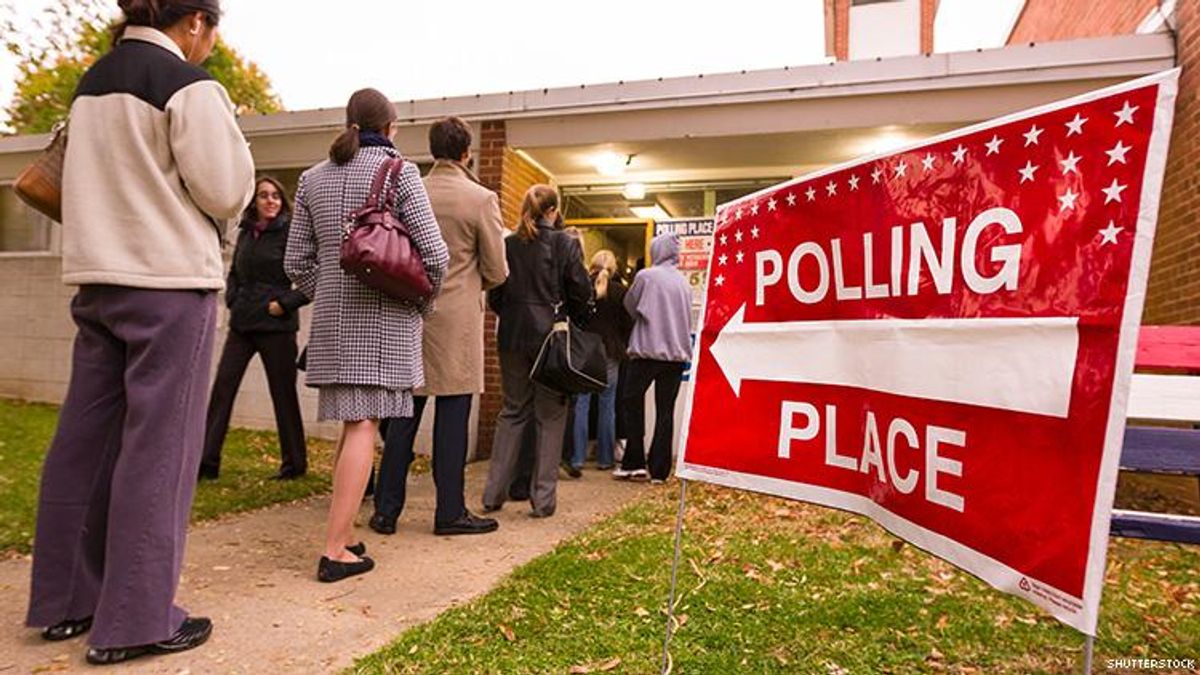It seems like everybody is talking these days about what's going to happen in the the midterm election. Will there be a "blue wave" with Democrats sweeping the vote? Will Republicans maintain their majorities in one or both houses of Congress? Will enough white Americans get ginned up by Donald Trump's fearmongering about race and immigration so that he holds on to unfettered political power?
The commentary can sometimes seem like a play-by-play in a sports match, as though the only thing that matters is the latest take on who has the upper hand. To the contrary, LGBT voters - who are witnessing the Trump administration's near-daily assaults on transgender Americans and immigrants and the environment and anything that was accomplished during the Obama administration - know that there is much at stake in this election. Unfortunately, what too many of us don't know is that the outcome of the vote on November 6 will likely impact the lives of many of our elders in dramatic ways. In fact, AARP calls November 6 "one of the most important midterm elections in decades."
The reason is that the fate of the safety net for older Americans - which had its beginnings during the New Deal and has kept millions of elder Americans out of poverty since then - will likely be decided in this election. And the scary thing is, almost nobody (except for AARP and advocates for the aging) is talking about it. The seeds of the potential destruction of the safety net - including Social Security, Medicare (which provides health care for older Americans), Medicaid (which is the primary payer of long-term care in this country), and SNAP (Supplemental Nutrition Assistance Program, sometimes referred to as "food stamps"),were planted when Trump and Republicans in Congress enacted a major overhaul of the country's tax laws. That overhaul gave massive tax breaks to wealthy Americans and corporations, and those tax cuts are causing the U.S. deficit to balloon. Many suspect that one purpose of the tax overhaul was, in fact, to create the pretext to gut the safety net. It's not hard to imagine so-called deficit hawks (many of whom voted for the massive tax breaks) arguing that we have no choice but to cut what they call "entitlements" like Social Security and Medicare in light of out of control deficits.
In fact, the widespread use of the language of "entitlements," with its pejorative aura, is yet one more brilliant messaging feint by conservative forces. The reality is that Social Security and Medicare are not entitlements but earned benefit programs - older Americans have paid into these programs throughout their lives with the faith that these programs would be there when needed. Now we are being told the country can't afford these "entitlements," that older Americans are a burden on society, and that the programs designed to support them must be reined in, and soon.
Whether these assaults on the safety net will succeed in gutting protections for older Americans depends to a great degree on what happens November 6. Republicans have signaled that they intend to go on the attack if they keep control of both houses of Congress. To be clear, the future of the safety net for older Americans is not as simple as Republicans versus Democrats.There are some Republicans who genuinely support maintaining the safety net, just as there are some Democrats who are wobbly on the issue. The key, as AARP has pointed out, is to educate ourselves about the candidates' positions on Social Security, Medicare and the rest of the safety net, and to vote accordingly.
This is even more important for voters from the LGBT community. Many of us are particularly vulnerable as we age, and therefore need the safety net even more than older Americans in general. For example, because we are much less likely to have children and partners to take care of us as we age, and because we often don't have the support of our families of origin, we rely more on Medicaid for elder care in our later years. (Long-term care is so expensive in this country that even older Americans who are relatively comfortable often run out of money when in care and are forced to turn to Medicaid.) And on average we have lower retirement savings and assets, which means that we are more likely to go hungry in old age and more likely to use nutrition programs like SNAP. Our lower retirement savings also make us more dependent on Social Security as our primary source of income in old age.
All of which means, if we want to take care of our elders, we must educate ourselves and we must vote on November 6. But if history is any guide, most of us won't. In the last midterm election, in 2014, turnout was only 36 percent -- the lowest since 1942. In fact, the U.S. ranks 26th out of 32 in terms of the percentage of people who vote in advanced democracies. This must change on November 6.
As we gear up to celebrate the 50th anniversary of the Stonewall uprising, it's critical to remember that the only reason we have the rights and equality that we enjoy today is the hard work and struggles of LGBT people who came before us. Those people are now our elders. They need us to educate ourselves about which candidates have the backs of older Americans, and to turn out and vote for those candidates on November 6. Let's do it!
MICHAEL ADAMS is the CEO of SAGE: Advocacy and Services for LGBT Elders.


















































































